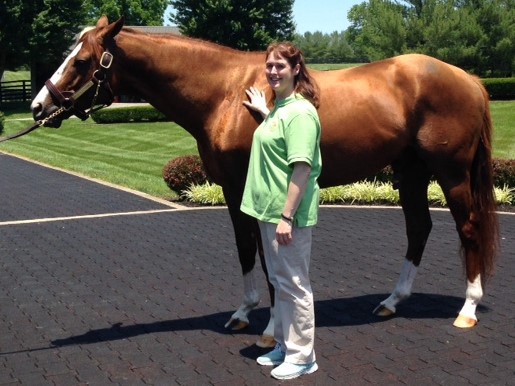
What attracted you to the horseracing industry?
I’ve loved horses since I can remember, but when I was younger the only way I could participate was by watching horse races on television. That was my introduction to the industry.
What aspect of horse racing do you enjoy the most?
I’m interested in horse breeding and bloodlines. It’s really intriguing to look at the breeding background of a horse to try to figure out in what race it will run best, or what horse to breed it to later. I read everything I can about horse bloodlines, such as BloodHorse magazine online.
How many horses do you own?
I have a riding horse, named Tonka, but he’s not a Thoroughbred. He’s a Haflinger. I’m in one traditional racehorse owner partnership involving a 3-year-old Girolamo gelding, who will hopefully be racing this year in Ohio. I also co-own four different racehorses with Wasabi Ventures Stables.
Why did you join the Wasabi Ventures Stables Co-Owner Club?
It was a reasonable financial investment that got me involved in following racehorses. I’ve found that in the traditional partnerships, I can only be involved in a very small way. Wasabi Ventures Stables’ Co-Owner Club, on the other hand, has given me the ability to be very involved in multiple horses, instead of just one.
Since joining the club last year, what I like most about the club as it has evolved is the contact I have with other co-owners through Slack and Facebook. I don’t have that with my traditional racehorse owner partnership.
I really enjoy being able to communicate with other people who have similar interests. I’m in Michigan, and we have a racetrack, but horse racing isn’t a big business here. There aren’t a lot of people involved in my regular “horse life” with my Haflinger. I’m around people involved with dressage and Western-style riders, but mainly these are people who don’t have an interest in racehorses. So, it’s nice to be able to communicate with people who want to talk about racehorses.
Years ago, horse racing used to be popular in Michigan. Some big name horses raced at the Detroit Race Course, which is now closed. So, horse racing was a bigger industry many years ago in Michigan, but over the years it’s died out. The only Thoroughbred racing track that’s open is Hazel Park Raceway, which was a former standardbred track. It’s a fun time to visit there and watch the races. They have nights when they have hot dogs and pops for $1 each. It’s really cheap entertainment and it’s a lot of fun, but it isn’t what racing is at, say, Laurel Park in Maryland, Churchill Downs, Santa Anita, or any of the other big tracks. Most people that come to Hazel Park Raceway don’t know anything about horse racing, but sometimes they have music acts and other entertainment there, which brings people in.
What is the state of the racehorse breeding industry in Michigan?
The breeding industry in Michigan is very small. The interest that you find in other areas of the United States — such as in Kentucky — isn’t here.
Are there any issues in the industry that you’d like to see addressed?
I think growing the fan base is a big one. Various tracks have scheduled a lot of entertainment, such as at the Pegasus World Cup at Gulfstream Park and the Preakness Stakes at Pimlico, to try to get more people interested in following horse racing. I went to Equestricon’s inaugural event in Saratoga Springs, NY last year, and I think that will hopefully build interest. But to have a constant crowd, I think the fan base situation is problematic.
Of course, there’s the bad image many have of horse racing, such as the administering of medications to the horses, that needs to be considered. The fans aren’t necessarily people with horse healthcare experience, so they don’t always understand the medical reasons for some medications. I know that puts a dark mark on horse racing. I’m not saying drugs should or shouldn’t be administered to horses, but there are times when there are medical reasons for them that I don’t think the general public understands. Horses appear to be these big, strong animals, but they can be quite fragile. I’ve owned riding horses since I was 16, so I understand that it doesn’t take much for horses in general to get hurt.
Who is your favorite racehorse?
My favorite horse of all time is Genuine Risk, the 1980 Kentucky Derby winner. The Kentucky Derby she competed in was the first one I remember watching. As a little girl, seeing the female horse running and then winning was a big deal for me. She placed in both the Preakness Stakes and Belmont Stakes. I know there have been other fillies that ran in Triple Crown races, but there haven’t been any that finished in the top four in all three races, so she was quite the racehorse
Unfortunately, she didn’t pass that on to her foals. Her owners had a difficult time getting her in foal. She only had two babies, and neither of them made any mark on the track. Part of what makes racing so exciting is that you don’t know if a foal will be a successful racehorse or not. There’s always the possibility that that baby in the field could be the next graded stakes winner. You just don’t know.